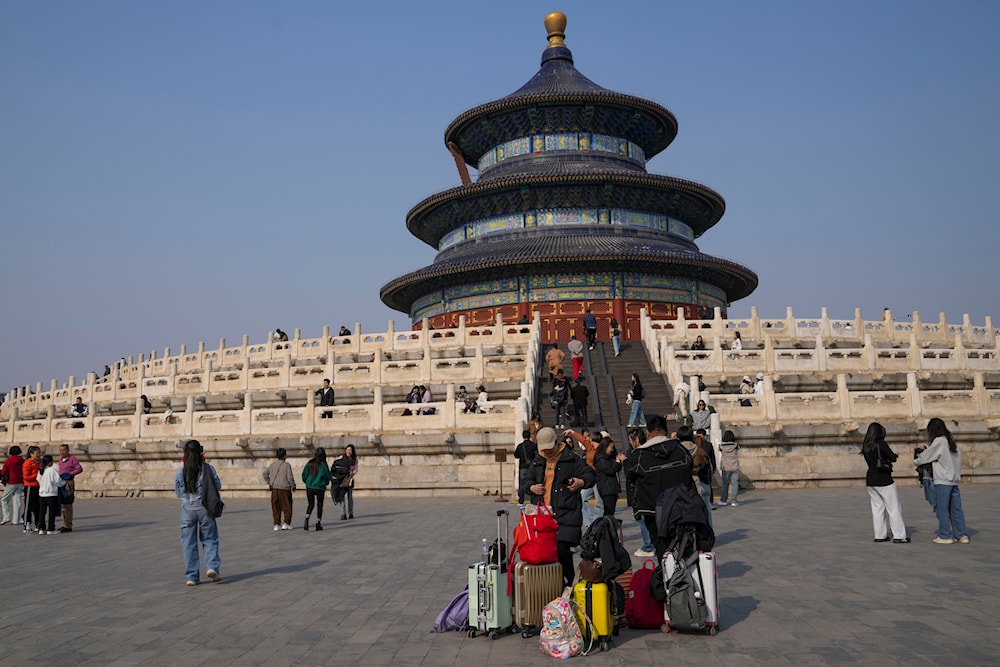Survey shows majority of Southeast Asians prefer China over US
If southeast asians had to pick sides between China and the US for regional alignment, a survey reveals that the majority would go for the Asian giant.
-

People with their luggage visit the Temple of Heaven park in Beijing, on Tuesday, April 2, 2024. (AP)
Showcasing Bejing's growing influence in the region, more than half of Southeast Asians would now rather stand with China and not the US if forced to pick sides, a regional survey revealed.
According to the State of Southeast Asia 2024 survey published this week, usually conducted annually by the Singapore-based ISEAS-Yusof Ishak Institute, 50.5% of respondents voted for China and 49.5% voted for the US if the Association of Southeast Asian Nations (ASEAN) had to pick sides.
The survey of 1,994 respondents from academia, business, government, civil society, and the media was done between January 3 and February 23.
This is the first time Beijing outvotes Washington since the annual survey started asking the question in 2020, as last year, only 38.9% of respondents preferred China, with 61.1% favoring the US.
Team China
Among the 10 countries of ASEAN, Malaysia exhibited the strongest alignment with China with 75.1%. Indonesia and Laos came in second and third at 73.2% and 70.6%, as China's Belt and Road infrastructure initiative and strong trade relations have impacted these countries positively.
In addition, 59.9% voted for China as the most influential economic power in the region, also outvoting the US.
Team US
On the other side, half of the respondents showed distrust of China, with 45.5% saying that they have concerns over Beijing using its economic and military power to threaten their country’s interest and sovereignty, thereby keeping Japan as the most trusted major power in the region, according to the survey.
Vietnam showed the highest level of concern among respondents with 87.7%, closely followed by Myanmar at 87.6%. Thailand and the Philippines also showed concern, with 80.3% and 75.8% respectively.
The aforementioned countries also still preferred the US over China with 83.3% of respondents from the Philippines and 79% of Vietnam voting as such.
On taking sides
The survey also showed that Southeast Asians are reluctant to pick a side amid the growing US-China rivalry as only 8% believe that ASEAN should pick a side, because, according to them, neutrality is unrealistic.
However, 46.8% believe that the bloc should put more effort into strengthening its resilience and unity to withstand pressure from both countries.
Major concerns including geopolitics
It was also revealed that the economy stayed the top priority for respondents regardless of the ongoing geopolitical tensions between the United States and China.
The survey also showed that 57.7% of respondents in the region labeled unemployment and the chance of a recession as their major concerns. Climate change followed, standing at 53.4%, while concerns about increasing economic tensions between major powers stood at 47%.
As for the most urgent geopolitical concerns, the Israeli war on Gaza topped the survey with evidently high levels in Malaysia, Brunei, and Indonesia with the tensions in the South China Sea, global scam operations, and the war in Ukraine following respectively.
Modern Diplomacy: China's influence grows across Asia, Africa & Europe
Chinese influence continues to grow across the Middle East, making it "unavoidable" according to a March 13 new analysis featured in ModernDiplomacy (MD), an international magazine that characterizes itself as a "leading European opinion-maker."
As part of the argument that China became highly influential across Asia and Africa, the MD piece set the premise that China played a role in Middle East affairs, as shown in the most recent and successful Iran-Saudi agreement, as well as the approach to show interest in mediating the "Palestinian-Israeli conflict" as it seeks a "two-state solution" China also showed interest in brokering a Russia-Ukraine peace proposal, which MD considered proof of a growing role on the global level.
These premises dictate that China had remained neutral vis-à-vis all of the Middle East's conflicts, given that China's approach to international relations had been grounded in economic development and stability. According to MD, "China lacks the motivation to break down the security and political structure of the Middle East led by the United States." These global positions and efforts have "secured Chinese credibility in the region."
It is worth noting that MD wrote that China is "not in competition with the United States." This came at a time when the Middle East's relations with the US had been "filled with friction in recent years."

 5 Min Read
5 Min Read








